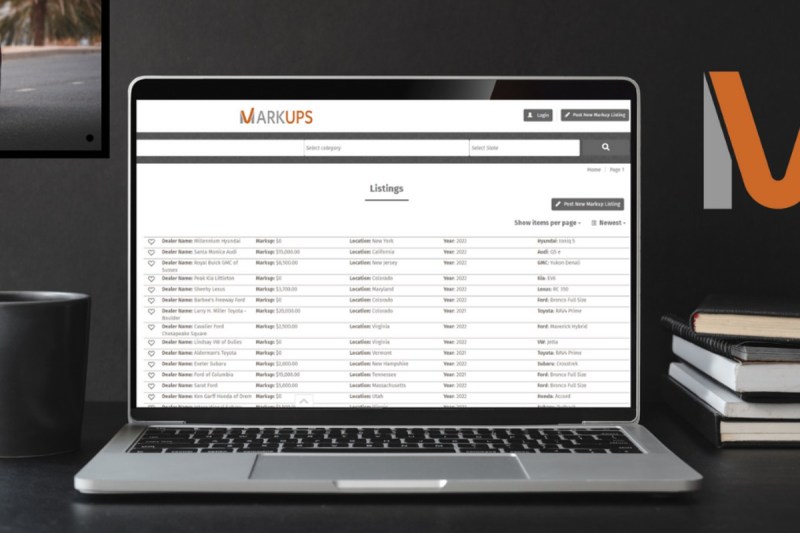While it’s lean times for global car makers, scrounging for scarce chips and parts, it’s prosperous days for auto dealers. Sitting in the Goldilocks zone between cash-fat post-pandemic consumers and a shortage of vehicles coming from atop, car sellers are living through an ascendant present, getting the most out of car sales.
Quarter 1 2022 profit reports declare that it’s a golden time to be a dealership. A May publication from Haig Partners found that the average gross profit per new vehicle sold sits at $6,244. In turn, the average publicly owned dealership made $7.1 million in the 12 months leading up to March 2022. Unfortunately, money begets greed, and reports of price-gouging are rampant. Consumers already dealing with higher fuel prices, elevated interest rates, and declining GDP now have to deal with more expensive vehicles. Fortunately, an elegant solution for consumers looking to buy new cars has emerged.

Markups.org now lists over 3,500 specific vehicles, the dealers selling them, and the dealers’ markup in an easy-to-navigate, searchable database. After launching in January, the site’s dealer markup listing has gone viral, with the worst markup offenders on Markups.org getting written up on Car and Driver and Jalopnik this summer. For now, Markups, a bootstraps effort, co-founded by siblings Tiffany Soucie-Howren and Trey Soucie are looking to disrupt an entire industry through crowdsourcing — the foundation for Markups.org and its competitive advantage.
“The problem with the majority of other new car search sites is that they are not using crowdsourced data — they are using the data dealerships provide,” Soucie-Howren said. “We have found that the majority of dealerships do not display the true markup data or mandated add-ons.”
Markups.org began as an individual response to a car seller trying to extort exorbitant profits from a pickup truck. In mid-2021, co-founder Trey Soucie traveled across Maine to purchase a Chevrolet Trail Boss pickup only to find the price not at MSRP, but marked up by $10,000. After wasting a day driving across the state, Soucie responded like a true car guy, funneling his angst into a novel solution. For the next few months, Soucie compiled a data set listing 500 to 1,000 self-sourced car prices and confirmed live numbers from forum posts.
Where Trey provided the research, Tiffany provided the know-how. Her background in scaling businesses and elevating them with subscription-based site marketing expertise convinced Trey to take the plunge to form an LLC in November/December to purchase a hosting site and start building the crowd-sourcing software. Since then, the concerted effort has generated considerable national exposure, allowing Markups to grow as an industry disruptor.
“It’s a great start, but the United States is a huge territory,” Soucie-Howren said in a conversation with The Manual. “We’d like to be able to help people on a granular level. If you’re searching for a dealership in Houston, Texas, we want to have enough data to look at every single dealership experience, so they know the best fit for them.”
Providing consumers with legitimate data not only fulfills the Soucie siblings’ mission, but these numbers are also sourced from primary research at dealerships.
“Oftentimes, consumers are not even seeing the real, out-the-door prices, with overpriced mandatory add-ons or markups added, until they are sitting in the finance office,” Soucie-Howren said. “We believe this is the real data shoppers want and deserve to see — the data that’s only brought to light by consumers firsthand, after spending time in the dealership or on the phone (or chat) with a sales rep.”
There was an expected pushback from dealers threatening to sue to recoup profits, but to date, there’s been no formal legal action taken against Markups for posting untrue or proprietary information. These are the prices that are put out to the public and the site only aggregates that data. For the time being, the founders moderate all posts. In the future, there are plans to employ third-party moderators. About 80% of disputes to date have been matched with consumer proof and there is a “report ad” feature to dispute listings.
“That triggers a more in-depth review of a post. We contact the user that made the post and begin the process of collecting proof and asking about the interaction with the dealership,” Soucie-Howren said.

This will be a more strenuous process in the near future for the website. One of its future product features will be a verification badge identifying the lister as a dealer, a verified user, or an unverified user. Incorporating all commercial parties is an important vision for Markups.
“We created it to become a tool of value for not only the consumers, but the dealerships, the OEMs, and data analysts,” Soucie-Howren said. “Dealerships can use our tool for competitive analysis. OEMs can use it to track their brand reputation and get use cases from. It enables data analysis and economists to have transparency into what is really going on in this part of the automotive industry.”
Looking at the over 3,000 cars listed on Markups.org right now, Soucie-Howren sees an odd consistent dichotomy — the same car brands and similar locations overlap between the worst offenders and most honest dealers. She estimates that Kia and Hyundai are both averaging around a $7,500 markup. Approximately 10 to 15% of Kia and Hyundai dealers, however, are not charging any markups. California and Texas share the highest number of non-markup dealers on Markups and some of the worst offenders (though this is likely tied to high urban populations). Luxury car buyers also need to beware, as the listings for Cadillac, Mercedes, and Lexus consistently average higher markups, probably thinking that high-end consumers are willing to pay a premium.
While Markups.org is a boon to consumers, the site makes money from only one sponsor right now — a partnership with Zach Shefska and the membership-based YAA auto advocacy service. Careful planning from partners will allow the site to exist for almost a year in the beta phase, collecting information, correcting mistakes, and polishing the interface for a scheduled Quarter 4 official release.
As the market continues to boom, data suggests that deals are worth the research. A $1000, $2,000, or $12,000 dealer tax is a major blow to dodge. With supply chain problems still a major issue due to COVID-19 conditions and a continuing microchip shortage, auto dealers are expected to continue to exaggerate new car prices through this year, at the very least. And the data suggests there are no brands not guilty of taking advantage.
“Toyota seems to be about 50/50 markup to non-markup right now,” Soucie-Howren said. “We would say (it’s) in the lead for non-markups, but even 50% isn’t a great number.”
Hard economic times require imagination to overcome. In an interconnected world, sometimes the best solutions come via clever spreadsheets. Take a look at the data for yourself.
Correction: An earlier version of this story incorrectly identified Markups.org as a non-profit. We apologize for the error.
Editors' Recommendations
- Here’s how to live in your car comfortably for a few weeks (or longer) like a pro
- From F1 to drag racing: Here’s a breakdown of all the major types of car racing
- Tesla stock just had its worst quarter, month, and year ever — here’s why
- Buying an electric vehicle? Here’s how to install an EV charger in your home
- Looking To Sell an Old Car? Here’s How To Get Top Dollar for It




